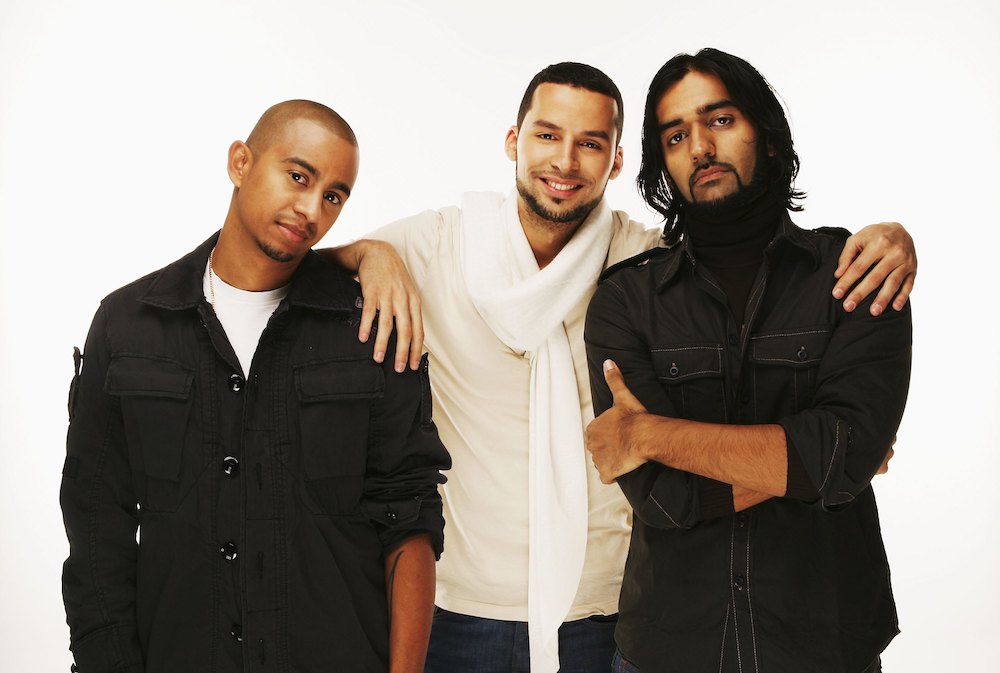LONDON: Five years after their decision to disband so that they could focus on finding the “right sound,” multi-platinum- and gold-selling hip-hop group Outlandish are back with a new single and an album due for release in the fall.
Having made a big impact on international charts over the past two decades, the Denmark-based group “love to take a stand on social and political problems that exist and affect us as human beings,” and try to reflect this in their songs, Lenny Martinez told Arab News during an exclusive interview with him and bandmate Waqas Qadri.
A case in point is “Paperchase,” which was released on June 24 and is the first single from upcoming album “The Cornershop Carnival.” Martinez explained that it is about a materialistic mentality — going to work to get paid to buy the things we want — that controls many people in an “unhealthy way,” including the way they think, act and treat other people, as opposed to doing something because they love it and being content with what they have.

Hip-hop group Outlandish released ‘Paperchase’ on June 24 as the first single from their upcoming album ‘The Cornershop Carnival.’ (Supplied/Outlandish)
“‘Paperchase’ is about changing this mentality … and not making material things the principal thing in your life, and not waking up just to make money; waking up to live life,” said Martinez, who moved to Denmark from Cuba at the age of 14.
The video for the single, which was written and produced by the band and filmed in Pakistan, depicts the struggles of a young boy who wakes up to go to work to provide for his family. He is seen dancing while listening to music on headphones as he tries to turn the negative aspects of his daily life into positives.
Outlandish was formed in Denmark in 1997 by Martinez, who was born in Honduras, Danish-born Qadri, who is of Pakistani descent, and Isam Bachiri, who was born in Denmark and is of Moroccan descent. They disbanded in 2017 and when they reformed two years later, Bachiri opted not to return and instead focus on his solo career.
They have sold more than a million singles and more than 300,000 albums worldwide. Their best-known hits include an English-language version of Algerian singer Cheb Khaled’s “Aicha,” “Guantanamo,” “Callin’ U,” and “Walou.”
“Our music is about our daily lifestyle and everything that comes with it; our roots, our friends, where we grew up, which was a very cultural place where we have friends from everywhere,” said 45-year-old Martinez, who has a 6-month-old daughter.
He added that the group, which is on a five-month summer tour that includes gigs in Denmark, Romania, Turkey, Kazakhstan and Azerbaijan, draw their musical inspiration from many sources, including the Middle East.

Outlandish member Lenny Martinez was born in Honduras and moved to Denmark from Cuba when he was 14-years-old. (Outlandish)
Highlighting in particular the single “Look Into My Eyes,” which explores the Palestinian conflict, Martinez said that the group often incorporate Arab music and sounds, and even “the social issues that’s going on in the Middle East, which affect Europe too, in a way.”
Outlandish is known for the multi-faith nature of its members; Martinez is Roman Catholic while the other two founding members are Muslim. Martinez said that religion connects them and their different faiths are their strength.
“In the beginning, the media always focused on (the fact) we are Muslim and Christian, and we didn’t really think about that — we were just kidding around and doing some music,” he said.

Outlandish disbanded in 2017 and when they reformed two years later, band member Isam Bachiri opted not to return and instead focus on his solo career. (Getty Images)
“But of course, as you grow up you know that these things are important, because I think that when you meet each other is when the magic happens when you’re different. If everybody was the same, there (would) be no magic.”
The three founding members lived in the same neighborhood when they were teenagers. They used to meet up at a local youth club after school, which was where they began to play around with music and dancing. Bachiri’s decision not to return when the band reformed three years ago forced the others to readjust.
“If you take away one member and there’s two left, the body has to adapt,” said Qadri. “We spent a lot of time trying to find the core of how the dynamics between me and Lenny will work and still be Outlandish.”
He said the pair have reached a good position where they are “thriving” but have managed to retain their “essence,” and that it was “a beautiful feeling” to be able to continue their legacy by once again creating songs and performing together.
“We were childhood friends, so you can never replace one person with another … but first things first, no one can take Isam’s place for what he did, and second of all, it’s not Outlandish if we have a (new) third member,” added Qadri, a 46-year-old father of two whose children appear in some of the band’s music videos.
Turning his attention to the upcoming new album, he said it reflects where he and Martinez are in their lives now, as adults, fathers and citizens of a changing world, while still remaining deeply rooted in the “Outlandish DNA” their fans are familiar with.
“It’s very colorful, it’s very warm, it takes elements from a lot of different cultures and mixes it beautifully with music,” said Qadri.
The bandmates said that when they started out in the music business they were 17 years old and their main priorities were to “make their first album” and “conquer the world.” As they have grown older, however, they say they have changed and developed and now see things rather differently.

Outlandish member Waqas Qadri, a 46-year-old father of two, was born in Denmark and is of Pakistani origin. (Outlandish)
“We are happy that people can still relate to our songs, and the youngsters can, but we also know we’re not 16 or 17 anymore,” said Qadri. “We are just acting our age and talking about things that are dear to us.”
The music industry has changed drastically in the past two decades, he added, and the process of making an album now is more “open and vibrant,” with no set format. Even after an album is released, extra tracks can easily be added, which was not the case with CDs or vinyl in days gone by.
“‘The Cornershop Carnival’ is set for release in the fall and then we’ll probably keep adding tracks to it because we have such a good flow with songs right now,” Qadri said. “And that’s a really cool thing, that you can keep adding tracks to an album as long as you want, basically.”

The Denmark-based group has greatly impacted the international charts over the past two decades. (Outlandish)
He added that the band intends to be very productive and active in terms of releasing new music in the next two years.
“I think we were (originally) just a product of our time and we will be the product of this time as well, because we don’t follow the music, the music follows us,” said Qadri.
“We are citizens of this world and we see what’s going on and how it’s changing, so the music just adapts to that.”
















